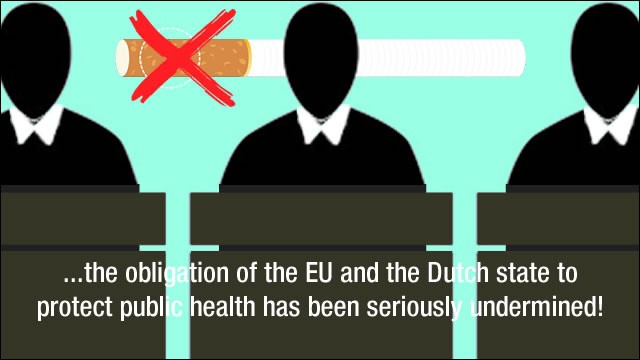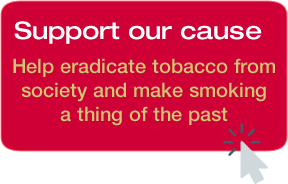Ruling by Administrative Court in Rotterdam: end of ‘rigged’ cigarette in sight?
9 February 2020

The Administrative Court in Rotterdam on 7 February reached a verdict on the question of ‘rigged’ cigarettes. The court expressed serious doubts about whether the current legal method for measuring cigarette emissions (the so-called ISO method), leads to results that are in accordance with other legal regulations. At issue here are the maximum levels of poisonous substances that smokers may inhale and the European Convention of Human Rights. The court has ruled that the obligation of the EU and the Dutch state to protect public health has been seriously undermined. Consequently, the court has requested a ruling from the European Court of Justice.
The legal action was taken by the Youth Smoking Prevention Foundation (SRPJ), the municipality of Amsterdam and a number of health organizations. They are seeking a ban on the sale of ‘rigged’ cigarettes.
‘Rigged’ cigarettes
European tobacco legislation has determined that a cigarette may emit a maximum of 10 milligrams of tar, 1 milligram of nicotine and 10 milligrams of carbon monoxide. The legislation also specifies that cigarette emissions must be measured using the ISO method. Both the SRPJ and the government agency charged with measuring cigarette emissions are highly critical of the method. This is because clean air is drawn in through small holes specifically made in cigarette filters for that purpose by the tobacco industry. According to the Netherlands National Institute for Public Health (RIVM), smokers actually inhale two to three times as much tar, nicotine and carbon monoxide as legally allowed. That is because smokers block these holes with their lips and fingers while smoking.
There is another measurement method that imitates smoking behaviour much more accurately. Called the ‘Canadian Intense’ method, it involves blocking the holes, thereby creating similar conditions as during ‘normal’ smoking. TheRIVM takes the view that the Canadian Intense measurement method approximates the reality of smoking much more closely than the ISO method does, even though the latter is prescribed by law and propagated by the tobacco industry.
Background to the legal challenge
The SRPJ called on the Netherlands Food and Consumer Product Safety Authority (NVWA) to enforce the legal maximums by employing the more accurate Canadian Intense method. The NVWA dismissed that request “because the law simply prescribes the ISO method”.
On appeal, the Administrative Court in Rotterdam has sided with the SJPR, which argues that the legal measurement method conflicts with the government’s obligation to protect the health of citizens, especially children, and that the Canadian Intense method should be used.
European law
Because a Dutch court cannot change European law on its own, the court in Rotterdam has agreed with the SRPJ’s request to seek a ruling from the highest court in the European Union, the Court of Justice in Luxembourg. That court does have the power to overturn European legislation and can also instruct the European Commission to solve the problem through legislation. The Administrative Court has also asked the Court of Justice whether the Netherlands can decide to replace the measurement method with a better one, until the issue has been settled at EU level. If the Court of Justice in Luxembourg agrees, this ruling could even mean that the NVWA can impose an immediate ban on the sale of filter cigarettes.
Delighted
Wanda de Kanter, chairperson of the Youth Smoking Prevention Foundation, is delighted with the ruling: “At last, the end of the scandalous ‘rigged’ cigarette is in sight. That does not mean that cigarettes will immediately disappear, and smoking remains unhealthy, but it is definitely an important step in the right direction.”
For further information, contact
Mr Phon van den Biesen, lawyer for Youth Smoking Prevention Foundation
https://vandenbiesen.eu/en/
+31 6 520 612 66
phon@vandenbiesen.eu
Op TabakNee staat de Nederlandse versie van dit artikel.
UPDATE
On 20 March 2020 the Administrative Court published the final version of its interim verdict, which can be downloaded here.





 Rookpreventie Jeugd is registered as a Public Benefit Organisation.
Rookpreventie Jeugd is registered as a Public Benefit Organisation.